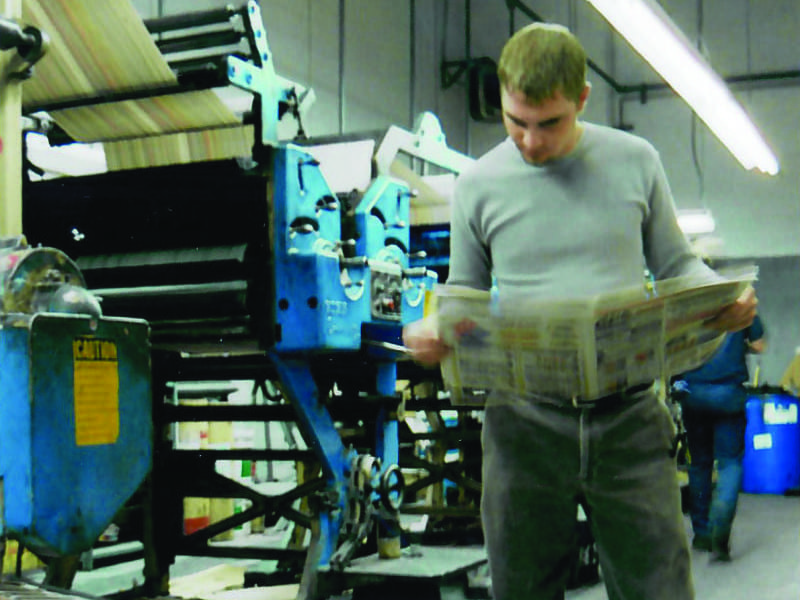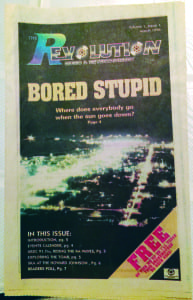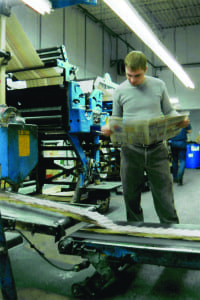 Interview by Mike Gardner
Interview by Mike Gardner
Josh Warburton could have written a couple of articles on what was happening in St. George, sold a few ads for some quick cash, and called it good. But rather than quit after his initial editorial staff (me included) fizzled out, he stepped up to the mic and soldiered on. And we are all better for it.
Mike Gardner: Give me a little insight about your history and what makes you who you are?
Josh Warburton: I was born in Boonville, California, up in the Boonies as they say. Boonville is in Mendocino County, Northern California. It was July 9, 1976. My family relocated to St. George in 1980. My dad had connections to Utah through his parents and grandparents and so forth all the way back to my great-grandfather who was my name-sake, Joshua Elijah Warburton. He was one of the Mormon settlers.
My dad grew up with more or less a Mormon upbringing. Although, kind of like myself, he had parents with differing religious backgrounds. He joined the Navy when he was of the age to do that, and right after that he joined the hippie counterculture playing electric guitar in a band for thirty plus years and defined himself that way.
As my parents moved here and lived separately, I got to see a very strong-willed woman in my mother. She basically raised us almost single-handedly. She was responsible for bringing home the bacon, so to speak, and doing everything that was necessary to keep us fed, clothed, and taken care of. And I can tell you it wasn’t easy. We had many frustrating times, difficult times. Back to school was a difficult time because we didn’t have a lot of money ever. And you’d go back to school with whatever you could rustle up. You know what I mean? And that’s kind of how it was.
When I was fifteen, I read a really good book called “Diet for a New America.” I didn’t make it a couple of chapters before I just decided I had to be vegan. It was just by far the most obvious path for me based on empathy and compassion and love for my fellow beings. I couldn’t be a part of a system that just said, “Well, you have to, you just have to eat meat. You have to eat dairy. It’s just the way it is. You’re going to be sick. You’re not going to be healthy. You just have to.” And I just said, “No, I don’t have to.” The book was very convincing from an ethical, environmental, and health standpoint. That book in particular just really connected to me, and I think it brought out a lot of what I always had known of myself.
MG: I remember you were working at The Spectrum when you approached me to be involved in this new publication idea. What made you want to start your own thing?
 JW: So this would have been exactly 20 years ago. I worked closely with German Reyna in the graphic design department. At the time, we just felt like there was a fair void in the market of entertainment coverage. We batted the idea around and even went so far as to talk to The Spectrum’s commercial printing department to see if they would be willing to print something if we designed it and could supply them with a print, and they agreed. I don’t think management thought it would last.
JW: So this would have been exactly 20 years ago. I worked closely with German Reyna in the graphic design department. At the time, we just felt like there was a fair void in the market of entertainment coverage. We batted the idea around and even went so far as to talk to The Spectrum’s commercial printing department to see if they would be willing to print something if we designed it and could supply them with a print, and they agreed. I don’t think management thought it would last.
For the first 10 months, we produced it as The Revolution. I think it’s still a good name. It was maybe a little too strong for Southern Utah and maybe not 100 percent appropriate for what its message was. It wasn’t designed from the outset to be an ultra-political sort of anti-government thing as The Revolution kind of sounds like. So we eventually switched to The Independent.
MG: When we first started out, there weren’t any long-term goals. You had no idea how long this would last. At what point did you say to yourself, “You know what, I’m committed to making this work”?
JW: Well to be honest, every two to three or four years, there’s one of those. But the first one was right when The Spectrum let me go. I was fairly newly married. Sky would have been around two, so I had to make a decision at that time whether or not it was something that I felt like I could stick with and potentially actually make a living off to support my young family.
And the first two years of the paper I don’t recall actually taking a paycheck. So if someone were to ask me, “How did you survive during those two years?” I’m not really sure. I’m not really sure how we made ends meet. I think for a period there, we lived rent-free at a family member’s place, but that didn’t last very long. It was a struggle.
Looking back now, we were maybe a little bit early for Southern Utah, and it’s probably why we struggled as much as we did for as long as we did. Coming into year five-ish, we picked up Kevin Jones as an editor. He was our longest-tenured editor, and through his humorous “Boneman” columns he helped define The Independent as something with its own attitude and character.
I’ve always described The Independent, even from its early days, as “a clearinghouse of ideas.” Not my ideas. Ideas period. I wish I had some sort of count of how many writers have contributed over the years. I dare say it might even be in the thousands.
Some people write for us for a really long time. Adam Mast has written for us nearly all twenty years, Rich Rogers for over a decade. But then of course we have many people who will write a single article or maybe write for six months or a year.
MG: What’s maybe one of the highlights that comes to mind in the past twenty years of doing The Independent?
 JW: It’s actually really, really difficult for me to choose a particular moment. I’ve had so many amazing highlights. I honestly can’t think of any one that really, really, really stands out above the rest. You know we’ve had articles picked up and published all over the world. Footage picked up and used on HBO shows. National notoriety is always nice when that comes along. But I would say every single time that we put out a print publication, I have that proud papa moment. It sounds a little emotional I guess, but it really is that way. It’s like giving birth to a new little baby, if I may make that analogy. Every single month, we get to put something out there that’s the collective work of a bunch of people.
JW: It’s actually really, really difficult for me to choose a particular moment. I’ve had so many amazing highlights. I honestly can’t think of any one that really, really, really stands out above the rest. You know we’ve had articles picked up and published all over the world. Footage picked up and used on HBO shows. National notoriety is always nice when that comes along. But I would say every single time that we put out a print publication, I have that proud papa moment. It sounds a little emotional I guess, but it really is that way. It’s like giving birth to a new little baby, if I may make that analogy. Every single month, we get to put something out there that’s the collective work of a bunch of people.
MG: As you look back, what advice might you give somebody who is embarking on a journey that might be similar to yours?
JW: I would say stick to your guns. If you have a good idea, work on it, develop it. Good ideas are rarely the very first draft of whatever ends up being the final product. So I would say stick with it, don’t give up easily.
I have people come to me almost every week who say, “You know what you should do with The Independent?” That’s my favorite line. And I almost always have to chuckle before they can answer, because I’ve heard it so many times. But I choose to be respectful, and I choose to listen to every one of their ideas, because guess what? You never know where the next brilliant one is coming from. Could be anybody you know. So just hear them out.
Take what you can that helps you, and try to discard anything that feels hurtful or negative. Almost nothing is as valuable as someone who can completely deconstruct your idea but then help you put it back together maybe in a different way than you thought of. Sounds painful, but think about what you just did.



